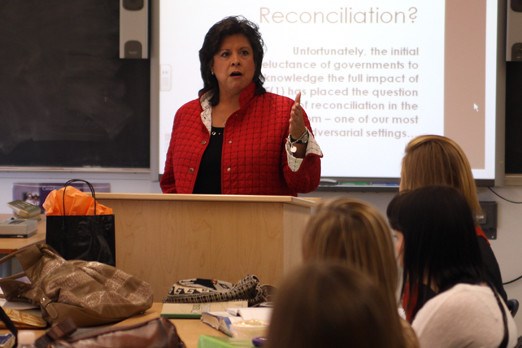Schools need to start teaching students about the contributions from First Nations people in Canada’s history an Aboriginal scholar says.
Dr. Cynthia Wesley-Esquimaux has been the Aboriginal scholar in residence at Lakehead University for the month of October. She’s also been visiting local high schools to talk about Canada’s truth and reconciliation process.
“I think the message is that we have a history in Canada that we need to have some regard for that many of them (students) haven’t been taught what I would call the true history of this country,” Wesley-Esquimaux said Monday afternoon before speaking with a Grade 12 University World Issues class at Westgate Collegiate and Vocational Institute.
“We need to start working toward a unification of understanding so that our future Canada is going to be united in a different kind of way.”
Reconciliation really started in 1982 with the Constitution Act but relationship building hasn’t gone the way the wording intended she said.
“It’s been that way because of the nature of the relationship from the beginning. This is all about land. It’s about resources. It’s about who controls those resources. Who gets to allocate them out. Who has the power and who runs the government.”
While First Nations in Canada haven’t experienced massacres and genocide like other Aboriginal populations throughout the world, there have been reservations, residential schools and the Indian Act she said.
“Which has basically undermined the governance structures of First Nations communities and it’s taken away a lot of their authority and their ability to make decisions in their own right,” Wesley-Esquimaux said.
Schools need to show students not only what Europe contributed to Canada but First Nations as well she said.
“It’s 2011. Native people were here when people got here. We’re still here and essentially that would say to me that we probably plan on staying for the duration.”
